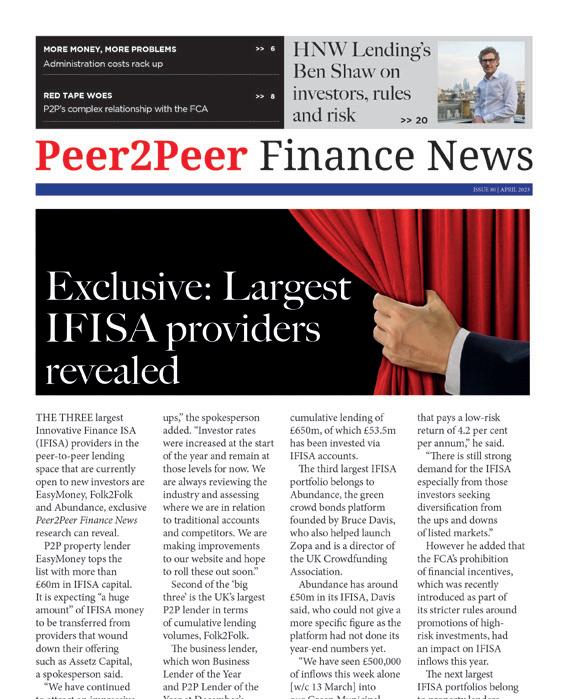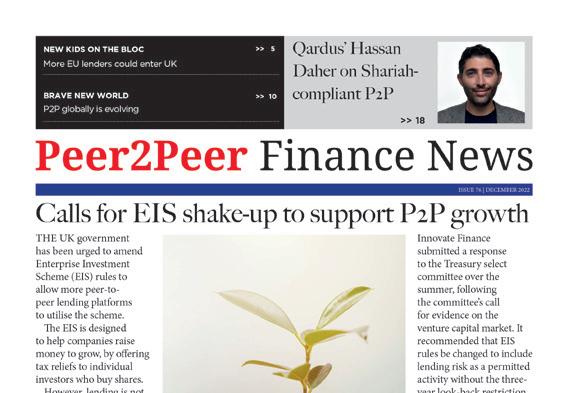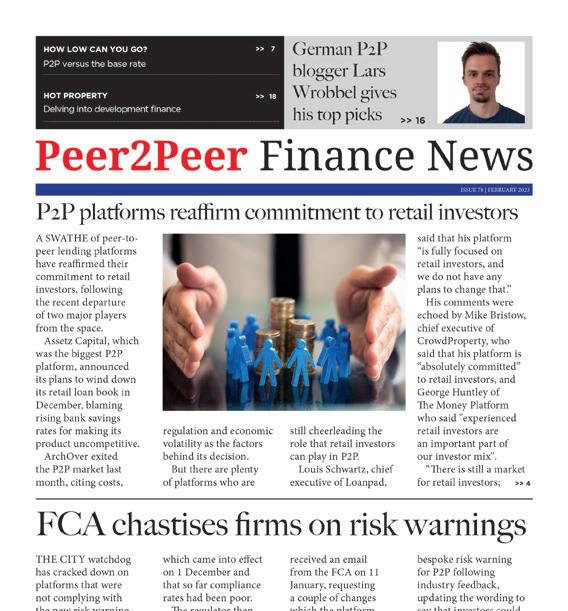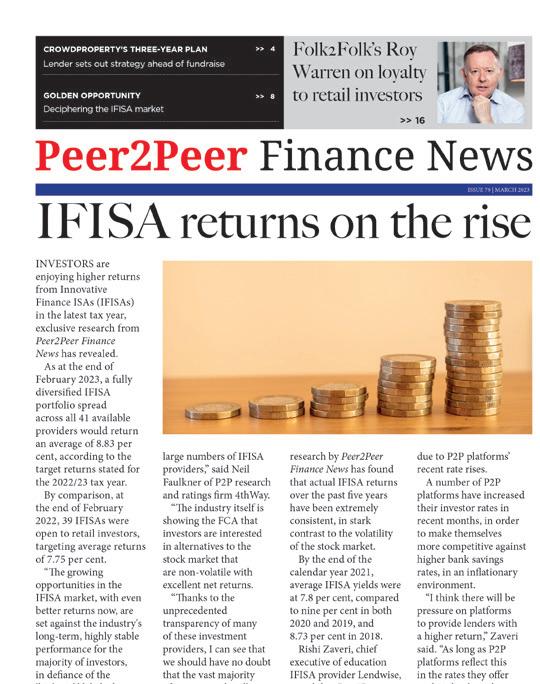We weigh them up for investors
How is the economic climate impacting P2P?
Innovate Finance’s 36H Group absorbed into trade body

INNOVATE Finance has disbanded its 36H Group due to the maturity of the sector, with its firms becoming full members of the fintech trade body instead.
The 36H Group was set up in 2020 as a sub-group within Innovate Finance and was supposed to be the new voice of the peerto-peer lending industry, replacing the Peer-to-Peer Finance Association.
Mike Carter, policy lead for lending platforms at Innovate Finance, said that as a result of the maturation of the sector, P2P lending is now one of the industry verticals within the trade body’s membership alongside regtech, small- and medium-sized enterprise (SME) lending, buy now pay later and crypto,

without the need for a separate group.
“Our P2P members are now all full members of Innovate Finance with full access to all our services,” he told Peer2Peer Finance News.
“This is part of our
integrated approach to Innovate Finance members' business needs, recognising that P2P platforms have broader interests than just P2P-specific issues.
“Current examples of this include the consumer
duty for consumer lending platforms and British Business Bank loan guarantee schemes for SME platforms, where Innovate Finance provides extensive input and support to members including P2P platforms.
“Our policy team will continue to respond to P2P consultations and issues as we do across all key fintech verticals.”
The 36H Group’s founding members comprised Assetz Capital, Funding Circle, RateSetter, Lending Works and Zopa, who have all since left the retail P2P lending market, and CrowdProperty which remains committed to retail investors.
Proplend and Lendwise are also members of Innovate Finance.
Two new IFISAs set to launch
TWO NEW Innovative Finance ISAs (IFISAs) are set to launch in the coming weeks, after HMRC authorised two more companies to
offer the peer-to-peer lending tax wrapper. This will bring the total number of IFISAs on the market to 43, up from 41 previously.
The IFISAs will be offered by NextCrowd and Paxiot. NextCrowd is a newly-created crowdfunding platform which operates as part
of the NextFin group. Its incorporated company, Business Agent, was granted an IFISA licence in March 2023, and also holds
>> 4 ISSUE 81 | MAY 2023 P2P VS BONDS
MACRO MATTERS
>> >> 7 10 Hogan Lovells’
16 >>
James Black on the evolution of the sector
The next step of your career starts here...
Browse thousands of lending and finance jobs today.

Search Jobs
Published by Royal Crescent Publishing
124 City Road, London, EC1V 2NX info@royalcrescentpublishing.co.uk

EDITORIAL
Suzie Neuwirth Editor-in-Chief suzie@p2pfinancenews.co.uk
Kathryn Gaw Contributing Editor kathryn@p2pfinancenews.co.uk
Marc Shoffman Senior Reporter marc@p2pfinancenews.co.uk
Hannah Gannage-Stewart Reporter

PRODUCTION
Tim Parker Art Director
COMMERCIAL
Tehmeena Khan Sales and Marketing Manager tehmeena@p2pfinancenews.co.uk
SUBSCRIPTIONS AND DISTRIBUTION tehmeena@p2pfinancenews.co.uk
Find our website at www.p2pfinancenews.co.uk
Printed by 4-Print Limited ©No part of this publication may be reproduced without written permission from the publishers.
Peer2Peer Finance News has been prepared solely for informational purposes, and is not a solicitation of an offer to buy or sell any peer-to-peer finance product, or any other security, product, service or investment. This publication does not purport to contain all relevant information which you may need to take into account before making a decision on any finance or investment matter. The opinions expressed in this publication do not constitute investment advice and independent advice should be sought where appropriate. Neither the information in this publication, nor any opinion contained in this publication constitutes a solicitation or offer to provide any investment advice or service.
News that Innovate Finance’s 36H Group is being disbanded is a good thing for the industry.
For a start, it removes the confusion of having two dedicated trade bodies with the same name (the other being the 36h Group subdivision of the UK Crowdfunding Association).
Innovate Finance’s policy lead for lending platforms, Mike Carter, told Peer2Peer Finance News that the decision was a result of the maturation of the sector.
He made the point that “P2P platforms have broader interests than just P2P-specific issues” and that their business needs can be integrated into the main trade body.
Given the brand recognition of Innovate Finance within the fintech space and beyond, it seems like a good idea to absorb its 36H Group into the wider organisation so that it can benefit from its other members and the sharing of ideas.
After nearly 20 years in existence, it’s time to stop seeing P2P as a fringe industry and instead, as a mainstream component of the fintech and lending ecosystem. The integration of the 36H Group into Innovate Finance may go some way to demonstrate this to all stakeholders.
SUZIE NEUWIRTH EDITOR-IN-CHIEF
We hope you’re enjoying the latest edition of Peer2Peer Finance News! We have now moved to a paid-for subscription model. If you would like to continue reading the magazine, please go to www.p2pfinancenews. co.uk/subscribe/ to find out about subscription options.
03 EDITOR’S LETTER
cont. from page 1
permissions to offer stocks and shares ISAs.

Meanwhile Paxiot is a white label crowdfunding solution which is affiliated with the RW Blears law firm. It is run by Ollie and Chris Blears, and RW Blears’ solicitor Frank Daly.
Roger Blears, founder and senior partner of RW Blears, told Peer2Peer Finance News that the platform will work with small- and mediumsized enterprises (SMEs) to allow them to run their own crowdfunding campaigns by offering IFISA-wrapped corporate bonds on their website.
“Paxiot exists to help SMEs raise capital by running crowdfunding offers from their own website,” said Blears. “Rather than going through Seedrs or Crowdcube, we can license the technology and it will appear as part of the company’s website.”
Paxiot is currently not fully in operation as the software is being updated to accommodate the recent financial promotion rules. However, it is expected to launch soon.
Ahead of the launch, the Paxiot website contained a message advertising its “custom fit, own brand investment portals…which utilise best in practice payment integration, regulatory compliance and investor
communication to help you execute a seamless direct investment round or offer to the public.”
Meanwhile, the NextCrowd platform launched at the end of April and is set to onboard its first clients “any day now,” according to Sacha Bright, founder and chief executive of Business Agent.
“It has launched and we’re about to take on three or four customers any day now,” Bright said.
“Our mission has always been to help entrepreneurs get the funding that they deserve. What we mean by entrepreneurs is not just equity businesses that are start-ups in the innovation sector – we’re talking about small property developers and developers with unique projects.
“Now we can match these entrepreneurs and developers with investors who are seeking to do more with their money and find different things to invest in.”
NextCrowd will sit alongside the NextFin crowdfunding platform
aggregator, which has been operational for the past seven years. NextFin describes itself as “a place where entrepreneurs, investors and alternative finance providers meet.” It rates and aggregates both equity and debt crowdfunding investment opportunities from a variety of crowdfunding platforms so that investors can make more informed decisions, and borrowers can seek new sources of finance.
Bright said that he expects to see a lot of overlap between users of NextFin and NextCrowd.
“We want to bring investors and borrowers together,” he said. “Offering a crowdfunding platform directly alongside the aggregation model will drive more people together.”
NextCrowd has partnered with Globacap which will handle all of its client money needs.
Bright added that he plans to relaunch the NextFin aggregator platform in the future.
“We are still collecting
data behind the scenes and we are planning to relaunch the aggregator in the future and we’re seeking new funding at the moment to do that,” Bright said. “But in the meantime we are going to be crowdfunding ourselves.
“We have our own IFISA licence now and we’re partnering with other businesses and we now have the ability to hold client money and do crowdfunding directly ourselves for developers and P2P loans.”
Both NextCrowd and Paxiot received their HMRC ISA manager authorisations in March 2023, after a speedy approval process of less than six weeks.
The IFISA market has been streamlined in recent years, with a number of IFISA managers leaving the market. Assetz Capital, ArchOver, Funding Circle and Zopa are among the former IFISA giants which have opted to cease working with retail investors since attaining their ISA manager permissions, leaving tens of millions of pounds of IFISA money in search of a new home.
Earlier this year, HMRC told Peer2Peer Finance News that no new IFISA licences had been granted since July 2021, when London Court was granted IFISA permissions.
NEWS 04
UKCFA’s 36h Group outlines strategy
THE UK Crowdfunding Association’s (UKCFA’s) 36h sub-group has set out its priorities for the year ahead as it marks its first anniversary.
The 36h Group was launched in March 2022 to give the crowdfunding trade body’s peer-topeer lending platform members a dedicated forum in which to discuss P2P-specific issues. Its initial focus was the Financial Conduct Authority’s (FCA’s) proposals on strengthening financial promotion rules for high-risk investments, which went live in February 2023.
Atuksha Poonwassie (pictured), managing director of Simple

Crowdfunding and director of the UKCFA, has revealed some of the group’s other core objectives.
These include lobbying the Treasury for support, especially regarding nonbank lending initiatives,
and to get the British Business Bank to better engage with the sector. Another aim is to promote P2P lending and regulated decentralised finance as a proven asset class and to provide standardised reporting to facilitate performance benchmarking.
Poonwassie said the group wants to prepare and update an investment paper aimed at family offices, discretionary fund managers, financial advisers and other financial services professionals, representing the 36h Group members.
The group also wants to persuade the FCA to “have certain P2P agreements recognised
as readily realisable securities instead of as restricted massmarket investments.”
She said conversations continue with the FCA on this and further details will be shared when appropriate.
The group now has six founder members: Abundance, Dacxi, Medici Legal, Rebuildingsociety, Simple Crowdfunding and Sourced Capital.
Founder supporters include Adempi, CMS and Legal Alternative.
The organisation is separate to Innovate Finance’s 36H Group, which is being disbanded and its members absorbed into the wider fintech trade body.
Regulation has narrowed the range of P2P products
THE FINANCIAL Conduct Authority’s (FCA’s) regulation of the peer-to-peer lending sector has narrowed the range of products available and may have “fatally undermined” the retail P2P investing model, a compliance expert has claimed.
James Black, a partner at fintech-focused law firm Hogan Lovells, told Peer2Peer Finance News that FCA regulation has come “at the cost
of having a vibrant and buoyant sector.”
“It is now a concentrated sector with a narrower range of products in the market,” said Black.
“The sector is now better from a consumer protection and market integrity perspective. It feels a bit like the FCA is throwing out the baby with the bathwater though and it has perhaps fatally undermined the retail P2P lending model.”
Hogan Lovells was
one of the first law firms to work in the P2P space, having advised Zopa on its entry to the market in 2005.
Black noted that P2P has changed “enormously” since then, with FCA regulation playing a huge rule in the evolution of the sector. However, he remains positive on the future of P2P.
“There are definitely opportunities,” added Black. “In the economy
that we live in there is always a need for funding so there will always be borrowers looking for a good deal and there will always be people looking for a return on cash.
“The P2P lending concept is still a really good one, it is the execution and regulation that has perhaps kept it down.”
For more on P2P and regulation, see our interview with James Black on page 16.
05 NEWS
New EU rules “more robust” than UK

THE NEW European Crowdfunding Service Provider Regulation (ECSPR) is “more robust” than UK-based crowdfunding and peer-to-peer lending regulations, according to one compliance expert.
The ECSPR’s detailed requirements around borrower due diligence go further than similar rules set by the UK’s Financial Conduct Authority (FCA), believes Tara Cantwell, legal and compliance manager at Lendermarket.
“The UK and EU P2P regulations are very similar when it comes to consumer protection,” said Cantwell.
“Both the ECSPR’s and FCA’s regulations are heavily focused on
investor protection. Both require P2P platforms to assess and categorise their investors based on wealth, knowledge and experience in investing. Both also require strong disclaimers with warning labels for capital at risk and losses that may be suffered.”
However, Cantwell added that she would consider the ECSPR to be “more robust” due to the enhanced scope of the EU rules.
Unlike UK regulations, ECSPR requires a certain amount of due diligence to be done on any new loan originator and borrower, including an assessment of criminal records and infractions relating to commercial, insolvency, fraud and
money laundering issues.
The ECSPR also requires a key investment information sheet (KIIS) to be provided for each individual project. Each KIIS must contain information relating to the underlying borrowing or capital raising, risk factors, investor’s rights, complaint’s handling, detailed information about the project owner and the project and the portfolio management of the loans.
“The ECSPR also recognises further business models that are relevant to the industry,” adds Cantwell. “For example, the possibility to organise secondary trading in securities on a crowdfunding platform.”
The ECSPR rules were introduced in November 2021, and all nationally licensed crowdfunding and P2P lending platforms must attain an ECSPR licence by November 2023. This licence allows them to operate across the entire trading bloc with ease.
The regulations aim to standardise the way that P2P and crowdfunding platforms across the EU, and promote transparency for both investors and borrowers.
P2P will play larger role as liquidity tightens
PEER-TO-PEER lenders are forecast to play a more significant role in the financial services sector as banks tighten their liquidity.
Ongoing economic volatility has already caused banks to pull back on lending, which has created an opportunity for alternative lenders to step in. With further base rate rises predicted this year, economist and business adviser Vicky Pryce told Peer2Peer Finance News
that she expects to see P2P playing a larger role in the lending ecosystem.
“More liquidity support from central banks has been made available, but the expectation is that lending conditions from banks may tighten ahead,” said Pryce.
“If that proves to be the case then P2P lending should have a bigger role to play even if interest rates start to fall at some point as is widely expected.”
Mike Carter, policy lead for lending platforms at Innovate Finance, echoed her views, stating that “the combination of the steady reversal of quantitative easing and potential changes to the bank deposit insurance and related bank liquidity rules is likely to reduce bank liquidity available for lending, and P2P lenders will be needed to help fill this increasing gap for small- and medium-sized enterprise
and consumer borrowers, as they have done over the last 10 years.”
Consensus estimates are that the base rate will rise by another quarter of a percentage point this month, to 4.5 per cent, while analysts believe that the base rate will rise to five per cent by the autumn of 2023.
For more on the impact of the macroeconomic climate on P2P lending, go to the feature on page 10.
NEWS 06
P2P versus bonds: How should investors choose?
THERE are many similarities between peerto-peer loans and bonds. They are both debt-focused investments. Both offer a fixed return over a set period of time, with the capital repaid at the end of the term. And both of these investments can be eligible for tax-free wrappers such as the Innovative Finance ISA (IFISA). Furthermore, neither of these investments are protected by the financial services compensation scheme (FSCS) and therefore come with a risk of capital loss.
However, this is where the similarities end. P2P lending is its own financial entity, regulated by the Financial Conduct Authority (FCA). It brings together lenders and borrowers on a third-party platform where lenders can choose to fund a variety of projects in exchange for a pre-agreed return.
The bond market is a little more complicated. It runs the gamut from corporate bonds to government-issued bonds (or ‘gilts’) and even P2P-like crowd bonds. Whereas P2P lending has only existed for less than 20 years, the first ever bond was issued way back in 1693. Its longevity naturally means that the bond market has matured exponentially. By 2021, according to
the Securities Industry and Financial Markets Association, the global bond market was estimated to be worth $119trn (£95.19trn).
By contrast, the current value of the global P2P market can be counted in billions.
This means that there is far more choice for bond investors, who can choose from a range of different risk options. Gilts tend to represent the lowest-risk bond option, as these bonds are issued and underwritten by national governments. The more financially stable the country, the lower the risk of the government defaulting on the repayment. This equates to lower returns.
Corporate bonds are considered to be higher risk, as they do not have the heft of a national government behind them.
Ratings agencies such as S&P can help offer some indication as to the risk profile of the corporation
behind a particular bond offering. If a company has an A+ debt rating, it is extremely likely that your money will be returned to you at the end of the term. If a company has a D rating, this indicates a higher risk of default.
As with anything in finance, the higher the risk, the higher the return. It is particularly important to bear this in mind when dealing with the bond market, as it often requires a high minimum investment threshold and a long term. Once your money has been invested in a bond, you could be penalised for removing it early.
In this sense, P2P loans offer something that bonds do not –liquidity. Most P2P lending platforms offer a secondary market where loans and loan parts can be traded at a premium or discount, depending on the market. This means that it is possible to exit a P2P investment

early without incurring a financial penalty.
Furthermore, all P2P loans can be held within an IFISA wrapper, which ensures that any interest earned on your investment will never be eligible for taxation. Confusingly, IFISA wrappers are also used on crowd bonds – a type of corporate bond which operates in a similar way to P2P lending, by inviting a group of investors to back one project.
Whether you choose to invest in a low-risk gilt, a higher-risk corporate bond, an IFISA-wrapped crowd bond or a P2P loan, the same rules of investing will always apply. Do your due diligence until you are confident that you understand the risk that you are incurring, and the likelihood of default. Never invest more than you can afford to lose. And always maintain a diversified investment portfolio which includes both debt and equity plays.
07 NEWS ANALYSIS
•





The world’s leading resource on peer-to-peer lending Subscribe today for full online access Peer2Peer Finance News (p2pfinancenews.co.uk) is the premier source of in-depth news, analysis, and insights on the fast-growing peer to peer lending industry. As a subscriber, you’ll have access to:
High-quality coverage of key topics impacting the P2P industry and its investors.
•
Up-to-the-minute news, features and opinions from P2P lending experts and industry professionals.
Daily news and analysis from Monday to Friday, and daily and weekly newsletters. Subscribe for just £1 for the first three months!* £9.99/month thereafter. Cancel anytime. Go to https://p2pfinancenews.co.uk/subscribe to sign up now.
•
Lendermarket applies for crowdfunding licence from Central Bank of Ireland
LENDERMARKET HAS applied for a crowdfunding licence from the Central Bank of Ireland as it seeks to become regulated under the new European Crowdfunding Service Provider Regulation (ECSPR).
It comes amid a push to onboard new loan originators, as the Dublin-based peer-to-peer lending platform continues its expansion.
Tara Cantwell (pictured), legal and compliance manager at Lendermarket, believes that the ECSPR will help to boost the profile of P2P lending across the EU.
“We definitely view the ECSPR as a benefit to the P2P lending market as it allows Lendermarket and other P2P platforms to more seamlessly develop and offer their services across national borders,” Cantwell says.
“Our investors are provided with an increased level of protection and guarantees.
“We are currently seeking our crowdfunding licence from the Central Bank of Ireland. We are covered under the transitional period which applies to those crowdfunding service providers who were providing a crowdfunding service within the state prior to regulation (EU) 2020/1503 entering into force on 10 November 2021.”
These transitional arrangements allow crowdfunding service providers to continue to provide crowdfunding services included within the scope of the regulation until 10 November 2023.
Lendermarket has plenty of existing experience working with
foreign regulatory requirements. Its loan originators are based all across the world and each new originator has to go through various stages of due diligence before their loans are listed on the marketplace.

“Initially, a preliminary review is made by filling in a questionnaire to establish certain details such as an overview of their lending products, loan portfolio and loan parameters,” explains Cantwell. “This stage is completed to better understand the loan originator’s operations and appetite for funding from Lendermarket and its investors.”
Next, the legal and compliance team conducts research on the company and validates the corporate information. This phase is conducted in line with EU crowdfunding regulations, as well as general anti-money laundering and ‘know your customer’ industry standards.
“Lendermarket then inspects the loan originator’s financial situation,” adds Cantwell. “Several things are evaluated including the company’s financial statements, their loan portfolio and satisfaction with the company’s risk and forex hedging policies.
“Only after the due diligence
procedures are completed, and Lendermarket is satisfied with moving forward, are the legal agreements drawn up. These agreements include setting covenants and finalising terms and conditions that must be met while the loan originator receives funding from Lendermarket’s investors.”
As the ECSPR is adopted by platforms across Europe, Cantwell believes that the new rules will lead to an increase in P2P lending across the EU, “especially considering the additional investor protection that the regulation requires”.
“We hope this leads to increased investor confidence and therefore increased lending activity across the EU,” she adds.
However, there is more to do in order to safeguard investors and promote P2P lending across the continent. Cantwell would like to see limitations placed on the amount of personal loans that a borrower can obtain – a law which has existed in Thailand and other Asian countries for several years.
“Increased limitations on the amount of loans an individual borrower can be granted could be a good introduction to the ESCPR,” she says.
09 JOINT VENTURE
Navigating choppy waters

Challenging macroeconomic conditions should not impede the growth of peer-to-peer lending, as Kathryn Gaw reports
NOBODY IS IMMUNE to the impact of macroeconomic volatility, including peer-to-peer lenders. Slow economic growth leads to higher base rates, which increases the cost of mortgages and other loans. Meanwhile, the rising cost of goods and services can eat in to any disposable or investible income, meaning that there is less money being used to fund vital projects
such as housing developments and business expansions.
P2P lending platforms have been quick to respond to these changes. Over the past few months, many platforms have increased their investor rates, citing a more competitive investment environment and the rising cost of borrowing. These higher investor returns have typically been covered by charging higher borrower rates.
Many platforms have also enhanced their due diligence processes to further reduce the risk of borrower defaults, or have taken on more institutional funding to supplement their retail investor base.
“Over the last six months we have seen slightly more re-terming requests and extension requests than we would ordinarily like,” says Paul Auger, chief operating officer
10 MACROECONOMIC OUTLOOK
at Kuflink. “You have to take a view on some of these that yes, we will extend the loan but on others we just want the money back.
“We need to be fair and equitable to our investors because it’s their money. We need to make sure that we keep an eye on what’s going on in the macroeconomic climate and we need to look at things on a regional basis.”
However, for the most part it has been business as usual for P2P lenders. After all, this is a sector which was borne out of the global financial crisis, and has already survived several recessions and a two-year pandemic. P2P lending thrives in chaos.
Furthermore, several platforms are spotting new opportunities in the current economic climate.
Latvia’s Lande Finance says that it is “battling to resolve the current market problems raised by investors” by financing agriculture projects across Europe. Meanwhile, property
lenders such as CrowdProperty and Kuflink have helped to bolster the housing market by funding hundreds of property developments across the UK.

As banks pull back their funding and raise their borrower rates, more and more businesses and consumers are venturing beyond the mainstream in search of financing. This too has created an opportunity for P2P platforms.
Unlike banks, P2P lenders are not directly influenced by the Bank of England and its recent rate hikes, but central bank movements will always influence platform economics. For instance, Kuflink’s senior management meets after every Bank of England interest rate decision, to discuss
any possible impact on the platform’s lenders and borrowers.
“It’s a fine balancing act because a few investors have asked us previously, why don’t your rates go up every time the base rate goes up?” comments Auger. “We have to balance that because there’s a margin that we have to achieve. It’s not as simple as putting the rate up, because if you put the rate up for the investors, you also have to put rates up for borrowers.”
This balance can be tricky to manage as higher borrower rates can potentially lead to a higher risk of default. The challenge for lenders is to maintain competitive investor rates without risking the underlying capital investment. Many platforms have opted to
11 MACROECONOMIC OUTLOOK
“
P2P lending should have a bigger role to play even if interest rates start to fall at some point”
offset this risk by taking a form of security on their loans. Usually, this security will be a property, which can theoretically be sold off in the case of a borrower default, in order to recoup investors’ capital. But of course, the macro environment can also wreak havoc on the value of these securities.
Banks have been quick to pass on the higher base rate to their mortgage customers, making the cost of borrowing much higher. Higher mortgage rates have led to a reduction in the number of mortgage approvals, which has contributed to a slump in housing prices. According to data provider LonRes, central London property prices dropped by almost five per cent in the 12 months to March 2023 –the largest annual fall in three-and-a-half years.
Luckily, most P2P platforms will limit borrowers to between 60 and 70 per cent of the value of the property that they are using as security. Known as ‘loan to value’ or LTV, this means that the property would have to fall in value by between 30 and 40 per cent before investor capital was at risk. A five per cent decrease in property prices is bad news for property owners and brokers, but it would have little to no impact on the value of the security behind P2P loans.
“Higher interest rates for many after increased debt accumulated during the crises of the past three years has already been taking its toll,” explains economist and
business consultant Vicky Pryce.
“What’s more, the recent difficulties faced by a number of smaller banks but also by Credit Suisse have highlighted the dangers brought about by the fast and sharp rise in interest rates over the past year.
“More liquidity support from central banks has been made available but the expectation is that lending conditions from banks may tighten ahead. If that proves to be the case then P2P lending should have a bigger role to play
even if interest rates start to fall at some point, as is widely expected.”
However, rates aren’t expected to fall any time soon. Over the past several months, inflation has been hovering around the 10 per cent mark, with little respite on the horizon. This has led to speculation that the Bank of England will increase the base rate by a quarter of a percentage to 4.5 per cent in May, with many analysts expecting the base rate to reach five per cent by the autumn.
Bruce Davis, managing director of Abundance Investments believes that prolonged high levels of inflation will change the investment landscape for everyone.
“Inflationary pressures and the increasing cost of money are changing the investment

12 MACROECONOMIC OUTLOOK
“ Inflationary pressures and the increasing cost of money are changing the investment landscape”
landscape,” says Davis. “Particularly for long term infrastructure projects where cost of capital is an important factor.”
Peer2Peer Finance News understands that the regulator is already meeting with platform representatives to navigate this new economic landscape, in a nod to the growing influence of P2P lending on the UK economy. This represents an opportunity for stakeholders to address key concerns, such as the lack of innovation in the UK fintech market.
"The key concern for the crowdfunding and P2P lending sector will be the continued pace of regulatory change which is causing significant uncertainty for UK finance businesses and risks,” says a spokesperson for the UK Crowdfunding Association.
“This makes the UK uncompetitive for developing new innovative finance propositions relative to the EU and US markets.”
Since P2P lending was founded in 2005, it has helped to fund billions of pounds worth of
construction projects, property refurbishments, business launches, business expansions and agricultural projects. Clearly alternative lenders can add value during times of economic volatility, by offering a safe harbour for beleaguered borrowers – just as long as they can pass the platforms’ strict credit checks.
And when the economy does pick up, there will be opportunities there as well.
“The economic conditions in 2023 have been better than expected six months ago, with inflation and energy bills starting to fall, which means P2P lenders should see better credit conditions for both lending and collections,” says Mike Carter, policy lead for lending platforms at Innovate Finance.

“The hope is that this trend continues for the rest of the year, providing a good backdrop for both lending and investor returns.
“Beyond 2023 there are some macro policy changes which could benefit P2P lending significantly,” Carter adds. “The combination of the steady reversal of quantitative easing and potential changes to the bank deposit insurance and related bank liquidity rules is likely to reduce bank liquidity available for lending, and P2P lenders will be needed to help fill this increasing gap for small- and medium-sized enterprise and consumer borrowers, as they have done over the last 10 years.”
As the aphorism goes, a rising tide lifts all boats, and P2P will benefit alongside other members of the UK economy when macro conditions improve. But in the meantime, the sector has yet another opportunity to demonstrate its ability to survive volatility while continuing to deliver steady returns to investors.
13 MACROECONOMIC OUTLOOK
“
Beyond 2023 there are some macro policy changes which could benefit P2P lending significantly”
For even more peer-to-peer finance news, go to our website at www.p2pfinancenews.co.uk.
With real-time news and exclusive insights, www.p2pfinancenews.co.uk is your indispensable portal into the world of peer-to-peer lending.
Go online to sign up to our e-newsletters, for a comprehensive digest of the latest peer-to-peer finance news sent straight to your inbox. You can choose our weekday e-newsletter, which comes out by 7am Monday to Friday, or sign up for our once-a-week version that is sent out at noon on Wednesdays.

www.facebook.com/p2pfinancenews
@p2pfinancenews @p2pfinancenews
www.linkedin.com/company/peer2peerfinancenews/

Warren: “Not all P2P is high-risk investment”
MUCH OF PEER-TOpeer lending represents a medium-risk investment, and Folk2Folk certainly sits towards the lower end of the risk scale, the company’s managing director has said.
Roy Warren (pictured), believes that P2P has a role when it comes to diversifying a sophisticated investor portfolio, with opportunities to suit various investment appetites.
His comments come months after the Financial Conduct Authority (FCA) passed a rule requiring all P2P platforms to display a warning on their websites which describes P2P investments as “high risk”.
“We now have to use this risk warning because the FCA has grouped P2P lending in with higher risk investments such as crypto assets, but we don't feel that we belong there,” says Warren.

“We really do respect the need for appropriate risk warnings, and it's paramount that people understand the true risk of each investment, but we are actually conservative lenders.”
Folk2Folk lends money to business owners and property developers, with all loans secured against UK land or property. The platform typically has a maximum loan-to-value of 60 per cent on any property security, which means that the property’s value would have to fall by at least 40 per cent before eating into the capital investment.
“With all the downturns we've seen in recent decades, we've never seen property prices fall by more than 25 per cent,” adds
Warren. “It’s difficult to imagine that property prices will fall by 40 per cent, although there are always exceptional circumstances.
“The highest-risk transactions are development sites where you could see a significant fall.”
When it comes to property development loans, Folk2Folk doesn’t use the standard gross development value, which predicts a potential sale price for the completed property. Instead, the platform assesses the development based on its value at the time of the loan application. This helps to reduce a key risk in property development financing – the risk that the development will not be completed.
This conservative approach to risk modelling has helped Folk2Folk maintain a record of zero investor losses, while growing steadily to become the largest P2P
lender in the UK with cumulative lending of more than £600m.
After delivering steady annual returns of 6.5 per cent to investors every year since its inception, the company has recently increased its starting interest rate to eight per cent, with some loan investments expected to offer double-digit returns.
While Folk2Folk – like all regulated firms – must still carry a visible risk warning on its website, Warren believes that in reality, Folk2Folk errs more towards the medium-low side of the risk spectrum.
“There are no guarantees with loans, apart from our security,” he explains. “So we're certainly riskier than a high street bank, but we're not that far off it.
“Our lending criteria wouldn't be much different to that of Lloyd's Bank or NatWest, but of course we would never compare ourselves to them.
“As long as it’s understood that liquidity is not guaranteed via our secondary market, we are not high risk,” Warren adds. “However, we are prudent, secured lenders with a minimum investment of £20,000 which places us as a niche player rather than mass market.
“P2P lending is not totally safe and within the P2P marketplace there is still much diversity in risk models and structures, but I think a medium risk label would be more appropriate for us.”
This is why it is so important for potential investors to educate themselves about the market and ensure that they understand every risk involved before they decide to invest.
15 JOINT VENTURE
Regulation evolution
Hogan Lovells partner James Black talks to Marc Shoffman about how the peer-to-peer lending sector has matured since Zopa’s launch
GLOBAL LAW FIRM AND consultancy Hogan Lovells has been involved with the peer-to-peer lending sector since its early days. The firm advised the world’s first P2P lender, Zopa, on its launch.
James Black (pictured), now a partner at Hogan Lovells, was just a trainee lawyer at the time. More than 18 years later, he advises clients across the fintech industry from startups to established players.

He advises on the implications of regulatory requirements such as product design, implementation of new legislation, commercial deals like co-branding or outsourcing arrangements and transfers of portfolios or businesses.
Black explains how the P2P lending sector has changed, the impact of regulation and the opportunities that still exist.
Marc Shoffman (MS): What is Hogan Lovells' involvement in the peer-to-peer lending sector? James Black (JB): We do a lot in fintech generally including a fintech mentor programme that is an incubator for startups. We have had quite a few clients come through there and go onto bigger, better things.
The scheme has invested more than a million pounds in supporting more than 30 fintechs, providing each one with up to £25,000 in free legal and regulatory consulting services.
Previous participants include credit platform Pillar and overdraft replacement app Updraft. We were doing fintech before fintech existed. Our clients have
always operated at the intersection of finance and technology. P2P lending is a good example of that.
We actually helped to set up Zopa. Hogan Lovells was involved
16 PROFILE
even before they were called Zopa. The team had a product, they came to us with an idea and we helped the founders to get set up to design a product that would work within, or at the time outside, the constraints of regulation.
That Zopa model for P2P with the micro loan structure was one I worked on as a newly qualified lawyer.
We have also been heavily involved with the Innovate Finance P2P group.
MS: How has P2P lending evolved?
JB: It has changed enormously. When I was first involved in 2005, P2P was new, exciting and different.
The evolution hasn’t necessarily been linear, it has broadened out into so many different types. You have got P2P for auto loans, for home finance, for business, retail, and so many different models, from Zopa-style micro loans to models that look a bit more like collective investment schemes.
MS: Has regulation helped or hindered the P2P lending sector?
JB: The thing that really changed the industry was the introduction of regulation. It was really a lesson in being careful what you wish for. That is partly because what the regulations didn’t do was to allow for all these different models.
The rules set out a fairly rigid definition of what P2P lending is and that became a bit of a problem as some models looked more like collective investment schemes. As long as you were within the definition of 36H loans, that meant you were automatically excluded from the definition of collective investment schemes.
That’s great if you were on the right side of the definition. But it made some models difficult to get through. The FCA took the view that if you are not in the definition then you are probably a collective investment and that was already a regulated activity. That caused a few issues and slowed down platforms getting authorised. The other thing that has caused problems is the general interest rate environment. With very low interest rates, that has impacted the returns that the platforms can offer investors. If you have banks offering to lend you money at 1.5 per cent but a P2P platform can only arrange loans at three per cent as they need to create returns for investors, that reduces demand.
As the economy took a bit of a turn for the worse, we then saw signs that the level of impaired credit in the market was increasing and that was making it harder for investors to feel confident of making a profit from their investments. All those things lead to a number of exits from the market or radical changes from business models. So Zopa is now a bank, whereas the whole point of P2P was to create something that competed.
MS: What is your outlook for P2P lending sector?
JB: As interest rates go up now, it will be interesting to see if that creates a resurgence of interest in P2P as banks tend to be historically slow to pass on increases in rates to savers. If as a lender you can get more from investing in P2P than putting it into a savings account, then maybe it will bring people back.
One thing that concerned investors was liquidity, platforms
need that churn of new investors coming in, that’s another reason platforms have moved to other forms and there has been this shift from retail to institutional.
The FCA probably feels the industry is under control, and in a good place from a regulatory supervision perspective, but it is at the cost of having a vibrant and buoyant sector. It is now a concentrated sector with a narrower range of products in the market.
The sector is now better from a consumer protection and market integrity perspective. It feels a bit like the FCA is throwing out the baby with the bathwater though and it has perhaps fatally undermined the retail P2P lending model.
MS: Could someone set up a retail focused lender nowadays?
JB: I would never say never, the fact that no one seems to be doing that suggests the appetite for risk is not quite there. There is still a place for P2P lending but the challenge is generating a product that produces a sufficient rate of return and a business model that has sufficient liquidity to meet all those things investors want.
MS: What are the main challenges and opportunities for the P2P lending sector?
JB: There are definitely opportunities. In the economy that we live in there is always a need for funding so there will always be borrowers looking for a good deal and there will always be people looking for a return on cash. The P2P lending concept is still a really good one, it is the execution and regulation that has perhaps kept it down.
17 PROFILE





2023
Kuflink eyes £500m loan book amid structural changes
KUFLINK IS AIMING
to grow its loan book to between £350m and £500m within the next two years, as the property lender makes a series of structural changes designed to super-charge its expansion.

The peer-to-peer lending platform has made two new hires to its investor relations team, in order to take a more proactive approach towards investor feedback. Already, some usability changes have been enacted on the company’s website and app in response to suggestions from investors.
Four members of staff have also been promoted into more “strategic” roles. Paul Auger (pictured) has moved into the role of chief operating officer, after almost a year as Kuflink’s head of products. Gary Prince has been promoted to chief financial officer, from his former role as head of financial control. Laura Hetherington is now chief of staff and operations and Hiran Patel has been named chief risk officer, managing the entire risk team.

Auger says that the company will be looking to make more senior hires in the future.
“We have made several promotions recently as well as increasing our head count,” says Auger. “In addition, we are also in the process of introducing a new loan origination and management system.”
Kuflink has partnered with a
high-profile software provider to implement a new software package that is set to launch soon. This package will give Kuflink the ability to spend more time, effort and money on developing the P2P platform to make it more attractive to investors, Auger says.
“Kuflink is privileged to be trusted by thousands of investors to be the custodians of their hard-earned money, and this is a responsibility we are taking very seriously,” adds Auger.
“We know that to attract further investment enabling us to increase our loan book we must continually
look at the policies, processes and procedures that we adopt to ensure we are making prudent lending decisions to get the best outcome for the investors on our platform. In this computer age we have more insight and data available to us to assist in our lending decisions.”

More than 26,000 investors are now registered with Kuflink, and the investor relations team reaches out to as many of these investors as they can to ensure that they are happy.
“We are actively selecting more and more people to make contact with,” says Auger.
“We’re attempting to contact every person that registers on the platform to make sure they are happy with the process and see if we can improve the onboarding journey.
“We are also learning more about the functionality they’d like from the platform.”
By prioritising investor feedback, Kuflink hopes to build on its substantial user base, and attract new investors.
More than £256m has been invested via the platform to date, across 936,472 different investment opportunities. Auger believes that the lender can double its business over the coming years by creating a seamless user journey which is compliant with all regulations, and offers competitive rates to both retail and institutional investors, while helping borrowers seek out affordable funding.
19 JOINT VENTURE
How do you protect your customers from fraud?
We ask the industry about the protective measures they put in place
undertakes extensive due diligence using independent valuers and lawyers. Relationships are established over years, with the majority of loans now being made to established clients.
Paul Sonabend, Executive chairman, Relendex


The prevention of fraud is at the heart of Relendex’s business model. Relendex employs a variety of methodologies: some, as you would expect from a P2P, are cutting edge, and others remarkably oldfashioned.
Modern technology allows the detection of money laundering, suspicious transactions and much more. The FCA is particularly diligent in these matters: as well as ensuring the protection of investor funds, they require client money and custody asset (CASS) audits, daily reconciliations, weekly compliance meetings and much more. These are all part of the DNA of a regulated fintech. Technology also provides much of the automated background checks on borrowers.
The old-fashioned checks are specific to Relendex’s commercial property lending sector. Relendex is not an algorithmic lender. In many ways, Relendex is a traditional, “know your client”, “boots in the field” lender. Relendex meets borrowers, inspects all sites and
Nothing is more important to Relendex than the strength of our reputation. This means protecting our lenders’ finances by ensuring that all measures are taken not only to provide an excellent investment product but also to guard against all forms of fraud.
Lee Birkett, Chief executive, JustUs


As a digital, compliance-first platform, we utilise the outstanding identity technologies available to verify that JustUs applicants are fit and proper before being accepted as a member.
Bartaby, Chief executive, Proplend
The potential for fraud to occur is an ongoing and real-time issue for all financial technology platforms and can arise in many forms throughout the customer engagement journey. Proplend fosters an environment of strong management commitment with effective controls which combines people, strategy, governance and risk assessment to build our robust fraud prevention strategy and then utilises the latest technology and analytics to detect, deter and prevent fraud anywhere across the platform.
Borrowers and investors, before any loans are approved, are screened heavily against many KYC digital databases, and adopting this live technology has prevented many bad actors attempting to enter our ecosystem.
Bruce Davis, Joint managing director, Abundance Investment
This question is a difficult one to answer – we have a number of anti-fraud checks and protections as
20 FIGHTING FRAUD
Brian
would be expected of any regulated investment firm – but obviously the specifics of what those are and how we combat attempted fraud are confidential as we would not want to put any information in the public domain to any potential fraudsters. My operations and compliance team run a very effective anti-fraud operation and we monitor carefully for any emergent threats (including cyber) or new strategies being used by fraudsters. Regulated firms have very clear responsibilities to help combat financial crime such as fraud or money laundering and we regularly test our systems and controls with third party security experts to ensure we are equipped with the latest anti-fraud measures.

The majority of new business is provided from authorised brokers or introducers who will complete their own Know Your Customer (KYC) checks. Our sales support team will ensure the introducer is Information Commissioner's Office (ICO) registered. Once the application is received with the sales team, prior to the application being submitted to the underwriting team, valid photo ID and proof of address dated within the last three months is required as well as the last three months’ personal bank statements and business bank statements if applicable.
Once the above has been provided, the sales team will submit the application to the underwriting team for review. Underwriting will complete a credit check, confirm the borrower is on the electoral roll, as well as an anti-money laundering (AML) check and CIFAS check to ensure the borrower is creditworthy.
Additionally, solicitors will ensure all borrowers have been verified with their own KYC, AML and source of funds checks, prior to a loan completing.
Narinder Khattoare, Chief executive, Kuflink

We minimise risk from due diligence undertaken on borrowers.
Furthermore, Google searches will be undertaken to investigate any negative publicity on the borrower, property or company. We also request the source of funds and evidence of funds, which is then confirmed at this stage.
Cormac Leech, Chief executive, AxiaFunder

On the claimant side, we rely quite heavily on the solicitors running the claims to verify the information relating to the case details. We also get extensive case documentation that we cross check for consistency. Solicitors are regulated by the Solicitors Regulatory Authority which is a useful validation point. We also do reference checks where possible.
On the investor side, we use automated onboarding systems to verify identities supplemented with ID and proof of address checks. We also have calls with investors which helps with the KYC process.
21 FIGHTING FRAUD
INVESTMENT PLATFORMS
Assetz Exchange is a property investment platform delivering long term stable income for investors, primarily through the purchase and leasing of housing for social good. Regulated by the FCA, it provides the opportunity for investors to create a diversified property portfolio and alternative funding options for the housing sector.


www.assetzexchange.co.uk

T: 03330 119830
E: info@assetzexchange.co.uk
Folk2Folk is a profitable UK lending and investment platform. More than half a billion pounds has been invested via the platform with no investor losses to date. Loans are a maximum of five years, secured against land/property at a maximum 60 per cent LTV, with a fixed rate of between 7.5 and 9.5 per cent, per annum.
www.folk2folk.com
T: 01566 773296
E: enquiries@folk2folk.com
Invest & Fund is an established alternative finance platform that has deployed over £220m on clients' behalf and has repaid over £140m to lenders with zero per cent bad debts written off. Lenders can achieve a diversified, asset-backed portfolio with gross yields averaging from 6.75 per cent per annum with an option to lend through an ISA or a SIPP for tax-free returns.
www.investandfund.com
T: 01424 717564
E: lending@investandfund.com
JustUs is an innovative peer-to-peer lender that provides a range of consumer and property-backed loans. It has lent out more than £25m and paid more than £1.7m in interest to lenders to date. Investors can enjoy returns of up to 10.29 per cent, with all products eligible to be held in an Innovative Finance ISA for tax-free earnings.
www.justus.co
T: 01625 750034
E: support@justus.co

Kuflink is an award-winning lender and online investment platform. With over £256m invested through the platform, investors can customise their own portfolio investing in specific loans or in a pool of loans diversified across a number of opportunities. Earn up to 9.73 per cent (compounded) per annum, with an IFISA available.
www.kuflink.com
T: 01474 33 44 88
E: hello@kuflink.com

LANDE is a crowdfunding platform that gives investors access to secured agricultural loans. It has created a unique scoring model, accessible infrastructure, and a variety of products so that farmers are able to access financing quickly and easily. With LANDE and its investors as partners, farmers can become more independent and sustainable, while improving their yield, efficiency and profitability. Projects offer interest rates of up to 14 per cent per annum.
https://lande.finance
T: +371 20381802
E: info@lande.finance
22 DIRECTORY
Lendwise is the UK’s only peer-to-peer lender that is dedicated to impact investing in education finance. Investors finance education for borrowers at universities and business schools across the UK and globally. Investors define their own risk appetite and use Lendwise’s AutoLend feature to diversify their strategy across a pool of loans, which can be invested in an IFISA wrapper earning average returns of up to nine per cent per annum.


www.lendwise.com
T: 0203 890 7270
E: lenders@lendwise.com
The European Crowdfunding Network (EuroCrowd) is an independent, professional business network promoting adequate transparency, regulation and governance in digital finance while offering a combined voice in policy discussion and public opinion building. It executes initiatives aimed at innovating, representing, promoting and protecting the European crowdfunding industry. www.eurocrowd.org
E: info@eurocrowd.org
Q2 creates simple, smart, end-to-end lending experiences that make you an indispensable partner on your customers' financial journeys. Its modular platform gives you the ability to manage lending simply throughout the entire loan lifecycle, from application, onboarding, servicing to collections. The result is a better experience for both borrowers and lenders.
https://eu.q2.com
T: 020 3823 2300
E: info@Q2.com

Our magazine is read by peer-to-peer lending professionals, investors and more. If you'd like to be included in our directory, please email Tehmeena Khan on tehmeena@p2pfinancenews.co.uk for details and pricing. 23 DIRECTORY
SERVICE PROVIDERS AND INDUSTRY ORGANISATIONS




*Don’t invest if you’re not prepared to lose money. This is a high-risk investment. You may not be able to access your money easily and are unlikely to be protected if something goes wrong. Take 2 minutes to learn more www.lendwise.com/invest/education +44 (0) 20 3890 7270 | lenders@lendwise.com This nancial promotion is issued by Lendwise Ltd, which is regulated by the Financial Conduct Authority under rm registration 782496. Lendwise Ltd is not covered by the Financial Services Compensation Scheme. Our products place capital at risk and you may not get back the full amount you lend and/or the interest you expect. You should consider seeking independent tax and nancial advice before making a peer-to-peer loan. Open your account today at www.lendwise.com/invest Make a di erence whilst earning a return by funding the postgraduate education of ambitious individuals Earn up to 9% p.a.* average returns in our ISA (tax-free) or Classic Account Invest in education nance & more















































